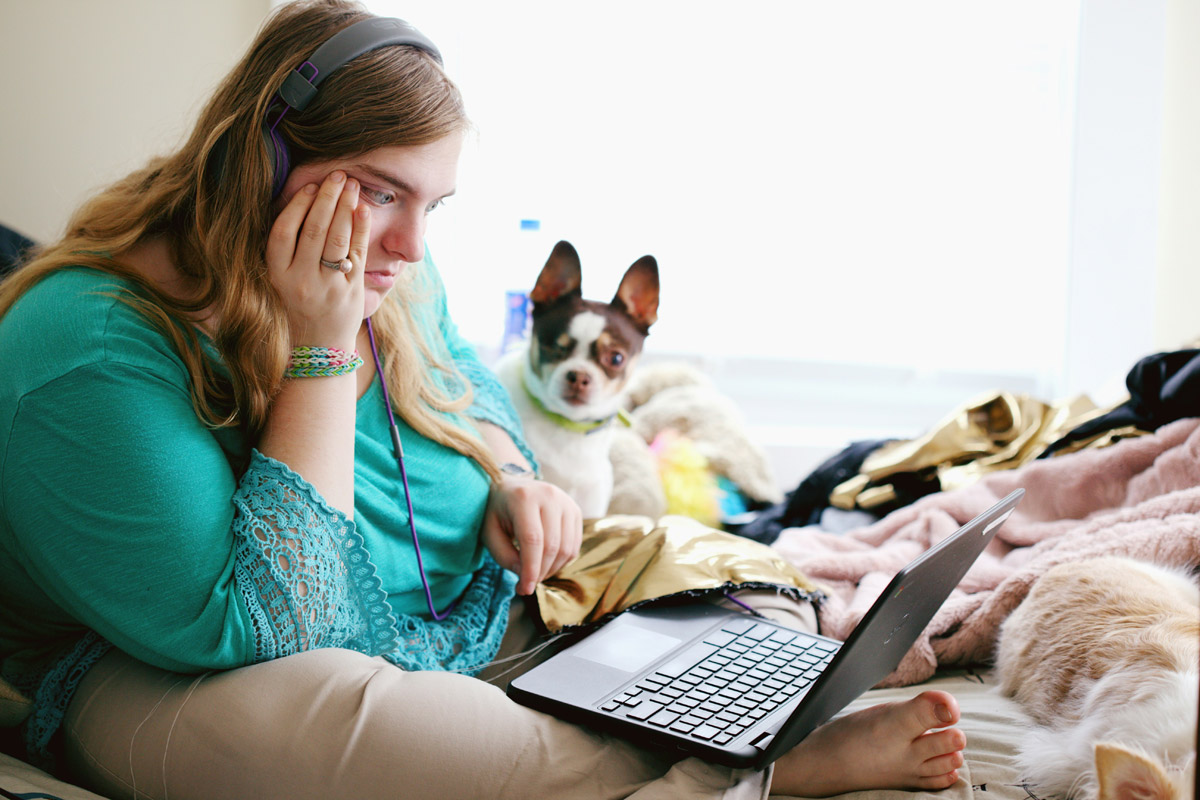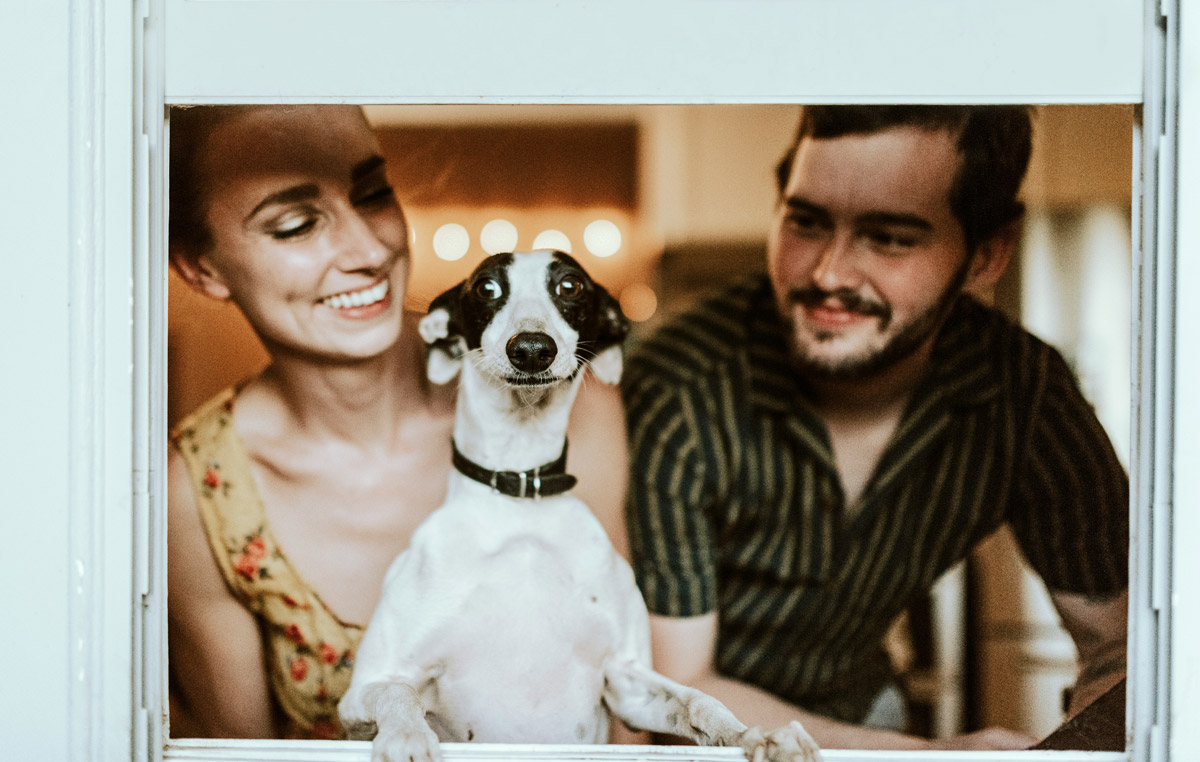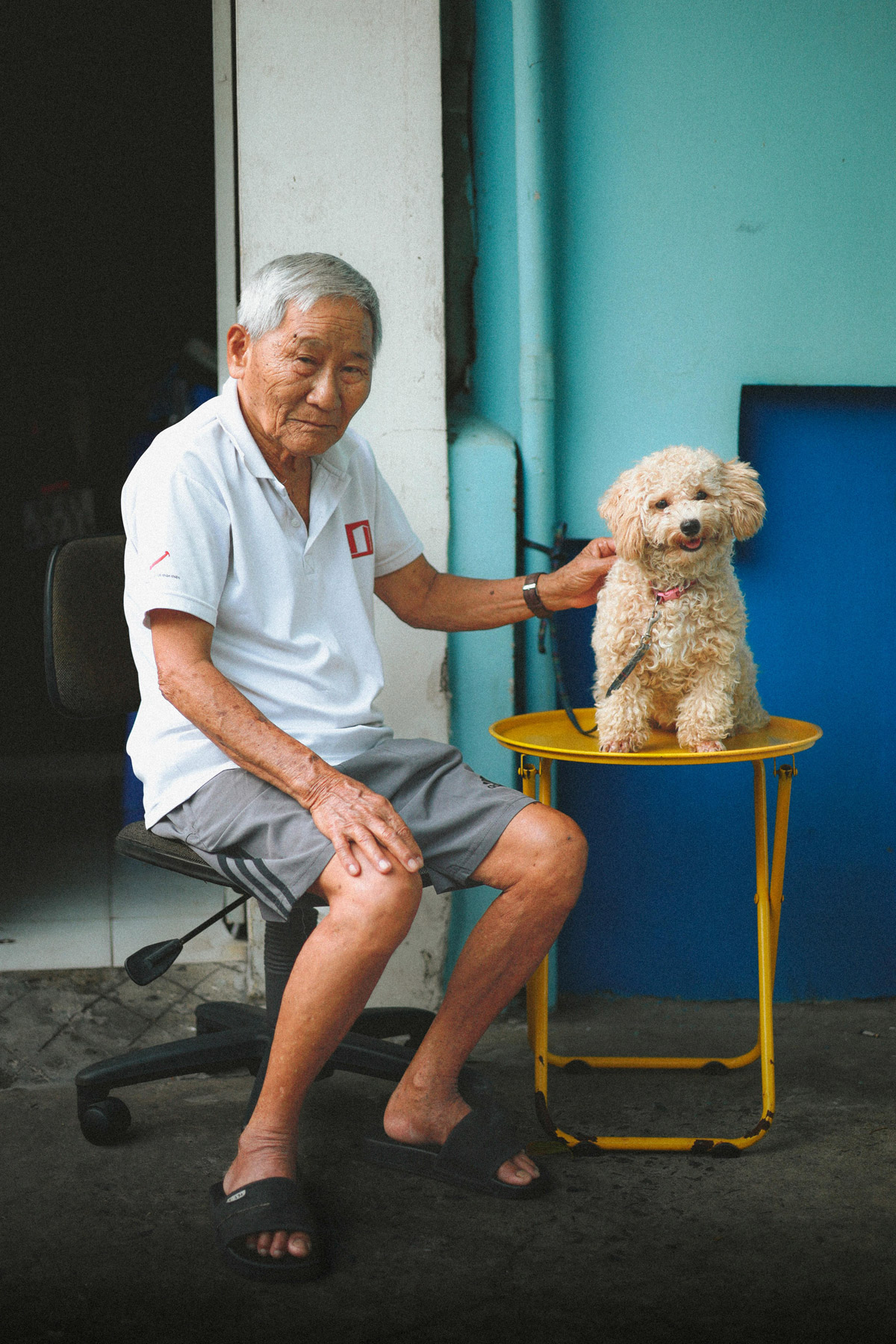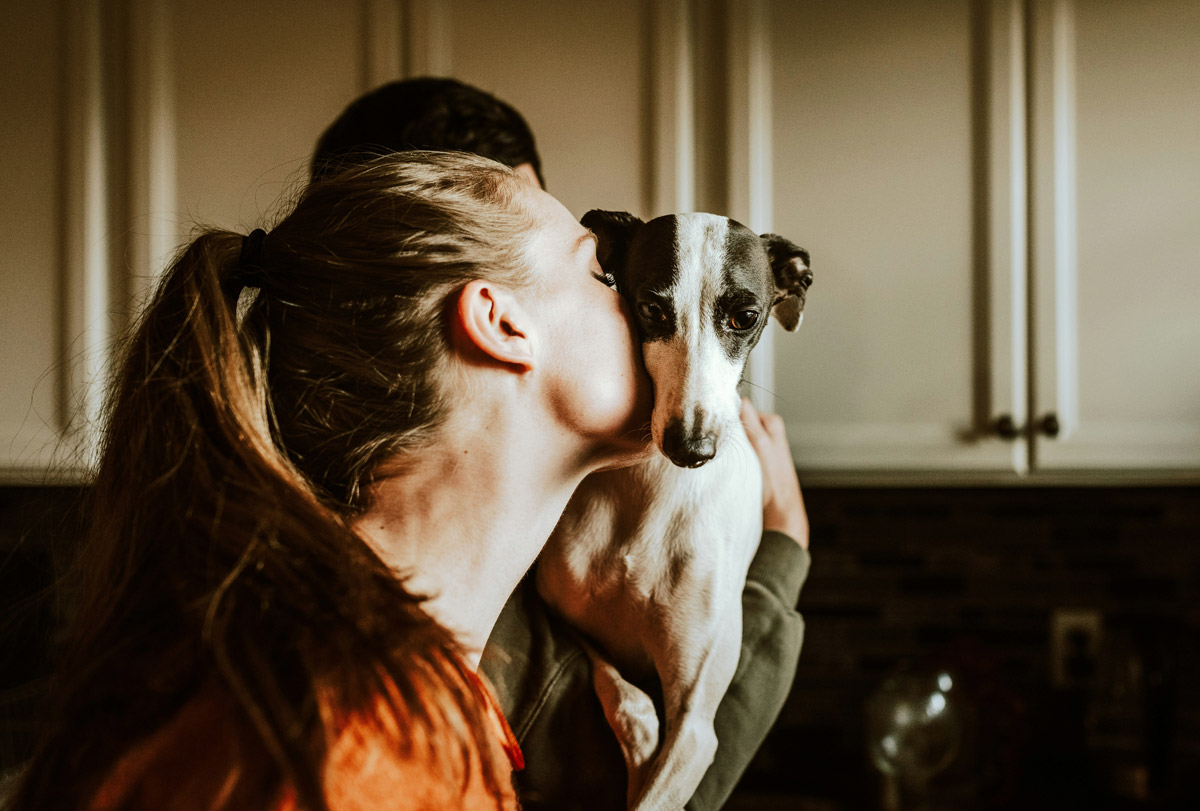
I can get pretty carried away in my head, projecting a complex panoply of thoughts and emotions onto my chihuahua-dachshund rescue My Girl. Logically, I know that she’s probably just wondering how soon she can get her next meal, walk, and cuddle. But still, that face is so expressive! Surely the side-eye is not simply her looking at me from the side, but a sassy clapback to indicate how peeved she is for being pulled away from a stray french fry on the street? Well, now researchers at the University of Bristol are sharing study results that show at least one strong emotion our pups pick up from us (thus proving it’s not all in my imagination). They say dogs can smell human stress, to the extent that it affects the dogs’ own behavior in response. Great, now I’m stressed about smelling stressed around My Girl!
We’re an ‘emotional contagion’ to our pups?! Our four-legged friends experience “emotional contagion” from the smell of human stress — leading them to make more ‘pessimistic’ choices, say scientists. The University of Bristol-led study is the first to test how human stress odors affect dogs’ learning and emotional states. Previous evidence in humans suggests that the smell of a stressed person subconsciously affects the emotions and choices made by others near them. Bristol Veterinary School researchers wanted to know whether dogs also experience changes in their learning and emotional state in response to human stress or relaxation odours.
Smells like team spirit: The researchers recruited 18 dog-owner partnerships to take part in a series of trials with different human smells present. The participating dogs ranged from eight months to 10-years-od and consisted of two Springer Spaniels; two Cocker Spaniels, two Labrador Retrievers; two Braque d’Auvergne; a Whippet; a Golden Retriever; a Miniature Poodle and seven mixed breed dogs.
A test of bowls: During the trials, the dogs were trained that when a food bowl was placed in one location, it contained a treat, but when placed in another location, it was empty. Once a dog learned the difference between the bowl locations, they were faster to approach the location with a treat than the empty location. The researchers then tested how quickly the dog would approach new, ambiguous bowl locations positioned between the original two. They found that a quick approach reflected ‘optimism’ about food being present in the ambiguous locations — a marker of a positive emotional state — whilst a slow approach indicated ‘pessimism’ and negative emotion.
Stress test: Trials were repeated whilst each dog was exposed to either no odour or the odours of sweat and breath samples from humans in either a stressed — arithmetic test — or relaxed — listening to soundscapes — state. Researchers found that the stress smell made dogs slower to approach the ambiguous bowl location nearest the trained location of the empty bowl, an effect that was not seen with the relaxed smell. The findings, published in the journal Scientific Reports, suggest that the stress smell may have increased the dogs’ expectations that the new location contained no food, similar to the nearby empty bowl location. The researchers suggest that the ‘pessimistic’ response reflects a negative emotional state — and could possibly be a way for the dog to conserve energy and avoid disappointment. The team also found that dogs continued to improve their learning about the presence or absence of food in the two trained bowl locations and that they improved faster when the stress smell was present.
Why it matters: Study lead author Dr Nicola Rooney said: “Understanding how human stress affects dogs’ well-being is an important consideration for dogs in kennels and when training companion dogs and dogs for working roles such as assistance dogs. “Dog owners know how attuned their pets are to their emotions, but here we show that even the odours of a stressed, unfamiliar human affects a dog’s emotional state, perception of rewards, and ability to learn.”
Maybe I’m stupid (don’t answer that), but it took me a couple read-throughs to wrap my head around the construct of these trials, and I’m still scritchin’ my ears at some parts. Ok, so they trained dogs to know which bowls had treats and which were empty, and then they tested how the dogs reacted to the “ambiguous” bowls in new places. I’m still following along. And they determined that a happy trot to a new bowl indicated optimism while a slow approach pointed towards pessimism, and this is all before human smells enter the picture, yes? Then when they introduced stress-odors, dogs were more cautious, or pessimistic, about the likelihood of finding a treat, than they were when catching whiffs of relaxed odors. Did I pass that reading comprehension test? I’m sorry for approaching the conclusion slowly, it’s just that I recently went from a treat-filled bowl (lunch), to an empty bowl, which is now resulting in a negative emotion. Anyway, I ran all this by My Girl, to which she replied: “All I heard was ‘treat’ and ‘food bowl.’ Cough it up, lady.”
Photos credit: Chewy/Alexander Grey/Unsplash, Duytrg Truong/Pexels














My golden retriever is running to any bowl regardless of what is going on around her. I do believe they can smell stress – the connection to us is strong. We do not deserve them.
Of course dogs can smell and react to human stress; their scenting abilities are amazing and over thousands of years they’ve evolved living among us.
It’s not a smell thing, but I know a couple where the guy struggled to manage his frustration and anger … he wasn’t angry with his wife but would come home from work carrying all the negative emotions from that and from family and friends who really weren’t nice people. His emotions were understandable but the way he dealt with them wasn’t good or healthy. He wouldn’t listen to anyone who tried to point this out.
Then they got a dog. (A goldern retriever). Seeing how that sweet pup reacted when he was in that state … not fearful but obviously distressed and desperately seeming to try to comfort him *Finally* a light came on and he realized he needed to do some thingsdifferenty: leave the bad job, stop hanging around with a-hole “friends” and family, step up physical exercise, time outdoors, meditation, time with kind people and eventually, get counseling to deal with a lot of hard stuff from his past.
His wife laughs about it now “Me he’d never listen to when I told him how unhealthy that was (the ranting, the feeding the stress ball, etc) and how it was impacting me. Just 2 times seeing the dog react to it … and he was all “oh NOW I get it, I can’t keep putting this poor creature through that”
We know dogs can detect pregnancy, cancer, an oncoming seizure, changing blood pressure, and react, so this makes sense. I wonder what they are using this study for.
Their emotions show on their faces easily because they have highly sensitive nervous system receptors and get overloaded easily.
I’ll never forget a dog named DanDan on Paw Shelter who was rescued from the Vietnamese Meat Markets but never fully emotionally recovered from the ordeal, the expressions on that dog’s face were something I had not seen before.
Please tell My Girl that she is a very good girl!
Done! She accepted it gracefully, if a little expectantly.
“Well yes of course I’m a good girl, I don’t need you to say it! (Never stop saying it!!!)”
Humans detect it too without knowing it if you are close enough which is why it’s contagious.
I have a cat that knows exactly when I’m stressed out and comes and sits by me. Animals are amazing!
Recently, my dog was attacked by off leash dogs, while we were on a walk alone. When I finally got him to the car to go home, he was more concerned about me, checking on me through the drive and giving me kisses (though less volume and intensity). Now I wonder if he was picking up on my stress from the situation and trying to comfort me!
There was similar research with horses, with unsurprising results considering they are a prey animals.
Researchers had human test subjects watch horror or scary movies or comedies or happy movies. Cotton pads were held in the armpit to collect sweat and pheromones, which were then collected into individual sealed packaging.
The horses were monitored for heart rate, breathing rate and galvanic skin response (used in lie detection). Double blind test where the unidentified cotton pad was presented to the horses to smell, with heart rate, breathing and galvanic skin response typically reflecting an increase in stress in the presence of the samples collected from the scary films
Our Goldie is a de-stressor.
If any family member comes home from work/uni with a somewhat bad mood, he runs off to fetch either his favorite tennis ball or his leash. If those hints don’t work, he starts clattering with his food bowl. By the time we’ve found a treat, we’re sufficiently calmed down to talk things through with doggo, if no one else is home, or amongst us.
Since my cancer surgery a few months ago and recent chemo (started yesterday, I feel crappy) my cat has rarely left my side or lap. After my father died in 2003 I would often lie down for a cry and my other cat would come lie down beside me and hold my hand with his paw. For hours. I totally believe animals can sense these things.
Our pets are the best people. Glad you have an emotional caretaker in your cat, and wishing you strength right now. 💚
Sorry you’re going through it @Jaded. Animals are the best!
Yes! My cats have historically been so deeply concerned when I have been in the throes of grief. As I navigate disabling chronic illness, I have a cat who not only tries to nursemaid me when I am in the midst of a flare-up, he knows when I am about to get sick and will bring me toys and his blanket and stay by me. I’m so sorry you feel badly. You are kicking a5$ and taking names. Sending strength, healing, and love.
both of my rescue girls know when someone in the house is stressed, upset, or not feeling well generally. they are right there, and by your side. last fall I had a medical issue that caused me to be in bed in a semiconscious state for several days, and my girls took turns staying on the bed, by my side.
Dogs Know.